
Tetris Worlds is a version of the video game Tetris. Originally released in 2001 for Microsoft Windows and Game Boy Advance, it was later released for Xbox, GameCube, and PlayStation 2 in 2002. In 2003, an Xbox Live version titled Tetris Worlds Online and a single-disc compilation version were released for the Xbox. The latter was bundled with Xbox systems.
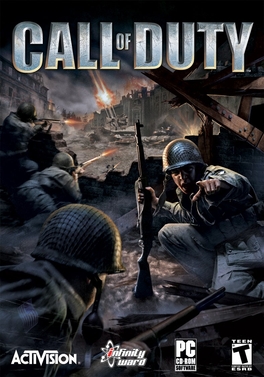
Call of Duty is a 2003 first-person shooter game developed by Infinity Ward and published by Activision. It is the first installment in the Call of Duty franchise, released on October 29, 2003, for Microsoft Windows. The game simulates infantry and combined arms warfare of World War II using a modified version of the id Tech 3 engine. Much of its theme and gameplay is similar to the Medal of Honor series; however, Call of Duty showcases multiple viewpoints staged in the American, British, and Soviet campaigns of World War II in Europe.

Grand Theft Auto 2 is an action-adventure game developed by DMA Design and published by Rockstar Games in October 1999 for the PlayStation and Windows, and the Dreamcast and Game Boy Color in 2000. It is the sequel to 1997's Grand Theft Auto, and the second main instalment of the Grand Theft Auto series. Set within a retrofuturistic metropolis known as "Anywhere City", the game focuses on players taking the role of a criminal as they roam an open world, conducting jobs for various crime syndicates and having free rein to do whatever they wish to achieve their goal. The game's intro is unique for a title in the series, as it involved live-action scenes filmed by Rockstar Games.

Chris Sawyer's Locomotion is a video game designed and programmed by independent game developer Chris Sawyer, and published by Atari Interactive in September 2004. The game is a simulation game in which the player takes on the role of a transportation company manager, building transportation networks and managing the flow of goods and passengers in order to compete against rival companies. Sawyer independently developed the game over nine years from the 1990s as a "spiritual successor to Transport Tycoon", with the game featuring "fundamentally the same" gameplay but with "differences in detail, scale and presentation" to update and refine the features that Sawyer "wanted to get right" in its predecessor.

RollerCoaster Tycoon 3 is a 2004 construction and management simulation video game. It is the third installment in the RollerCoaster Tycoon series, and was developed by Frontier Developments and published by Atari Interactive. RollerCoaster Tycoon 3 places players in charge of managing amusement parks; rides can be built or demolished, terrain and scenery can be adjusted, and prices can be controlled to keep visitors happy.

The Sum of All Fears is a 2002 tactical shooter video game which is developed by Red Storm Entertainment and published by Ubi Soft. It was released for Microsoft Windows, PlayStation 2 and GameCube, based on the Ghost Recon game engine; another version was released for the Game Boy Advance.

RollerCoaster Tycoon 2 is a 2002 construction and management simulation game developed by Chris Sawyer and published by Infogrames Interactive. Released for Windows as the sequel to RollerCoaster Tycoon, the game simulates the management of amusement parks.
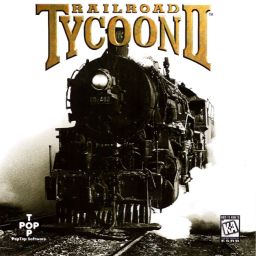
Railroad Tycoon II is a business simulation video game in the Railroad Tycoon series developed by PopTop Software and published by Gathering of Developers. It was released for Microsoft Windows, Mac OS, PlayStation and Dreamcast. It was later ported and released for Linux.
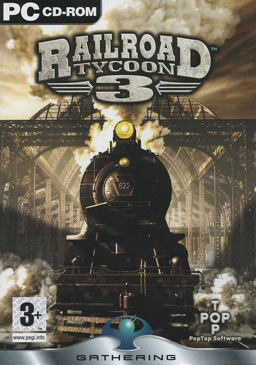
Railroad Tycoon 3 is a video game, part of the Railroad Tycoon series, that was released in 2003.

Mall Tycoon is a business simulation game, released in 2002 for Windows 95/98/ME. It was developed by Holistic Designs and published by Take-Two Interactive. It has two sequels: Mall Tycoon 2 and Mall Tycoon 3.

'Zoo Tycoon DS is the Nintendo DS version of the business simulation game Zoo Tycoon. A sequel to the game, titled Zoo Tycoon 2 DS, was released in 2008.

Mercenaries 2: World in Flames is an action-adventure video game developed by Pandemic Studios and published by Electronic Arts for PlayStation 2, PlayStation 3, Xbox 360 and Microsoft Windows. It is the sequel to 2005's Mercenaries: Playground of Destruction. The game is a third-person shooter with an open world, set in a fictionalized war-torn Venezuela. The game's primary objective is to kill the President of Venezuela whose betrayal of the protagonist mercenary acted as a stepping stone to their current position.

American Idol is a rhythm video game developed by Hothouse Creations and published by Codemasters for PlayStation 2, Microsoft Windows and Game Boy Advance. It is based on the reality talent show franchise Idol. The American version uses footage from the second season of the show, in which Ruben Studdard won the season. An Xbox version was planned and advertised in Germany and the UK in 2004 but cancelled.
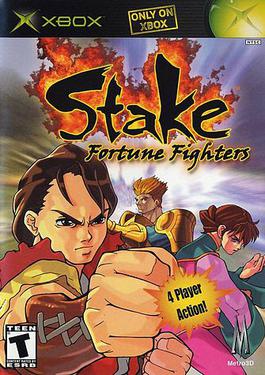
Stake: Fortune Fighters is a fighting video game that was released on the Xbox in 2003. It was developed by Taiwanese company Gameness Art Software and published by Metro3D.

FIFA Football 2004, also known as FIFA Soccer 2004 in North America, is a football simulation video game developed by EA Canada and published by Electronic Arts. It was released in October 2003 with the tagline "Create Brilliance".
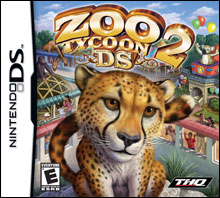
Zoo Tycoon 2 DS is a Nintendo DS game based on the PC game Zoo Tycoon 2. It is the sequel to Zoo Tycoon DS.

Moto Racer 3 is an arcade style motorcycle racing game developed by Delphine Software International for Microsoft Windows. It is part of the Moto Racer series and is the sequel to Moto Racer 2.

The Weakest Link is a video game based on the television game show of the same name, developed by Traveller's Tales and published by Activision under license from BBC Multimedia for the PlayStation, PlayStation 2 and Microsoft Windows platforms. In the English version, Anne Robinson, the television show's real-life host, features in the game throughout gameplay and recorded footage, beginning with the opening speech, at the beginning of each round, and during each round's voting stage. In the French version, Laurence Boccolini, the host of the show, is featured in the game for both gameplay and recorded footage.

The Cat in the Hat is a 2003 2.5D platform game for PlayStation 2, Xbox, Microsoft Windows and Game Boy Advance. The PlayStation 2 and Xbox versions were developed by Magenta Software. The Windows and Game Boy Advance versions were developed by Digital Eclipse. All versions of the game were published by Vivendi Universal Games. It is based on the 2003 film of the same name, which was released shortly after the game. A version for the GameCube was planned, but was never released. The Windows version is compatible with Windows 98, Windows ME, Windows 2000, Windows XP, Windows Vista, and Windows 7. It is not compatible with Windows 95 or earlier versions of Windows or Windows 8 and later versions of Windows.



















